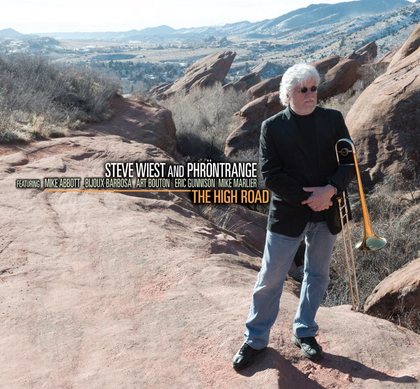
Steve Wiest earned his stripes with Maynard Ferguson, playing with and composing for him on three projects. I even got to see the Ferguson band back in the early 1980s and the work between Ferguson and Wiest was nothing short of electrifying.
Now, after teaching stints University of Texas at Arlington and University of Wisconsin-Whitewater and as a regular with the Doc Severinsen Big Band, Wiest has released an album of incredible complexity and power. It is innovative and intoxicating.
The band is comprised of Mike Abbot on guitar, Eduardo “Bijoux” Barbosa on bass, Art Bouton EWI, Eric Gunnison on keyboards, Mike Marlier on drums and engineer Michael Schulze, a key part of the band. Carmen Wiest and Matthew Wiest also appear as guest musicians on violin and cello, respectively. Collectively, this bunch bring the torches for Wiest’s own fire. And they burn it down. In a good way.
The album opens with The Vinnie Paradox a tribute to drummer Vinnie Colaiuta’s playing a 4/4groove with halfs on the cymbals and the paradoxical effect of the added bar of three. Colaiuta being the six-armed Shiva doesn’t hurt.
This is how you set the hook! Barbosa and Marlier work the groove as Abbott crunches alongside and trombone and horns synth produce a huge brass effect. The Latin effect after the midpoint is a brilliant springboard into Abbott’s raucous solo. The Fusion is staggering.
Cantaloupe Island is Wiest’s reworking of the great Herbie Hancock original. Wiest takes it down a rock alley and beats the daylights out of it. This is the track where Eric Gunnason gets to show his piano proficiency and profusion. The lush trombone recovers the melody from the rough handling of the guitar. This was a great piece and a fine showcase for Wiest’s talents as arranger. Somewhere Herbie must be smiling.
Violet Iris features guest artists, as mentioned above, Carmen Wiest (Steve’s wife) and Matthew Wiest (their son) on strings for the introduction. This song is a remembrance of Steve’s grandmother and her lush garden where the irises grew so profusely.
There are moments of languid reflection and of sensory overload. The pulsating groove and the soaring guitar over Jazz piano provide an outstanding backdrop to Wiest’s blistering horn. Gunnarson’s piano solo is excellent.
A Stern Talking Too is a nod and a wink to guitarist Mike Stern. Wiest works off the groove in Stern fashion and Abbott’s skill and talent on the guitar is a perfect tribute to the great guitarist. Barbosa turns in a sterling bass solo and is in command of the funk. Horns and keyboards enhance the movement forward. The twists and explosions are furious. Good God, this mother smokes. Play it, again!
Miles Slide follows. According to Steve, “Two of my favorite musicians in all of Jazz are Miles Davis and Slide Hampton. In this composition, I combine 1980s Davis with ‘Frame for the Blues’ Hampton as a tribute for all of us to enjoy.”
True enough, this is exactly what you hear. It is an evocative piece that causes the listener to visualize both of the masters working off each other. All of the artists are spot-on and oh-so-in-the-pocket.
What follows is a complete surprise. It is gorgeous and emotional. It is Please Don’t Think It’s Funny by Fred Rogers. Yes, Mr. Rogers of PBS fame. I found the YouTube video of Mr. Rogers singing the piece and it broke my heart. Steve Wiest’s version is just as much so. It is so honest and transparent. Fred Rogers will be remembered for so much and this piece, thanks to Steve Wiest, is sure to be one of them.
The album concludes with Shred or Shred Not (There is No Try). If the title isn’t enough to bring a smile to your face…well then, you’ve been dead for two weeks… or you know nothing of The Empire Strikes Back.
It is the shout chorus to the album. Everyone is at attention and the performances are without flaw. The movement is powerful and profound. Everybody shreds. Nobody shreds not.
There is only thing to do when this album sounds its final note. Turn it on, again.
Steve Wiest and Phröntrange have taken the high ground in Fusion-Jazz-Funk. They command a view that is broad and deep in their understanding and expression of life. The sincerity, the joy, the love they declare is a shout of hope.
 RSS Feed
RSS Feed
